SWIM by Liz Richardson
(8 minute read)
Swimming to happiness: Liz Richardson
Cumbrian playwright and avid swimmer – or is it dipper? – Liz Richardson introduces her spring 2022 show, SWIM… and the free audio version you can dip into while sitting gazing out across the water.
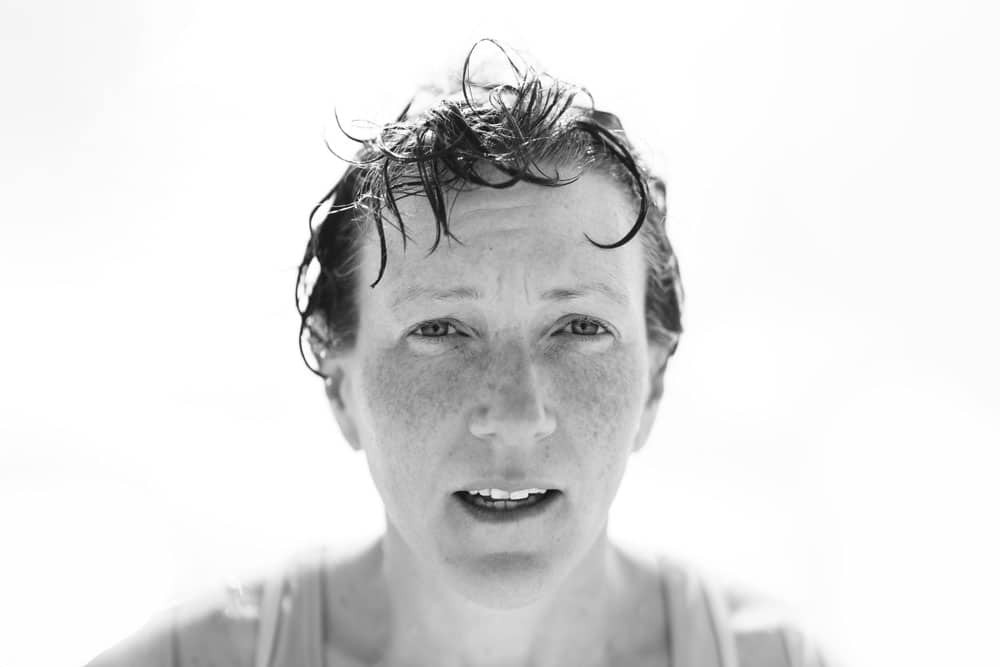
“The sensation of water flowing around my body happily floating down a river, watching the banks pass me by… I like to take the same journey as a river; it’s the lack of control which feels so good. It’s good to leave my life alone for a while.”
Growing up in the Lake District, actor and writer Liz Richardson didn’t spend a lot of time indoors. Roaming the mountains, playing in the river that flowed through her garden, and leaping into lakes, she learned to love wild swimming long before the term existed.
After a stint in the city honing her craft, treading the boards of theatres including The Globe and Southwark Playhouse – and dabbling in stand-up comedy – Liz returned to the hills, where she became immersed in a new community of swimmers. It was here that the idea for her show, SWIM, started to form.
“SWIM is about friendship, grief, nature, swimming in cold water, rural community, the humanness of existence and relationships,” explains Liz. Exploring the healing power of a bitterly cold dip – or “free medicine” as Liz likes to call it – SWIM opened at Theatre by the Lake in Keswick this spring, before embarking on a national rural and coastal tour.
With an abridged audio version of the play now available to listen to* for free, Liz reflects on the themes, inspirations, experiences and people behind her work…
* TRIGGER WARNING: SWIM includes descriptions of grief and mild references to child loss that could be upsetting to some listeners.
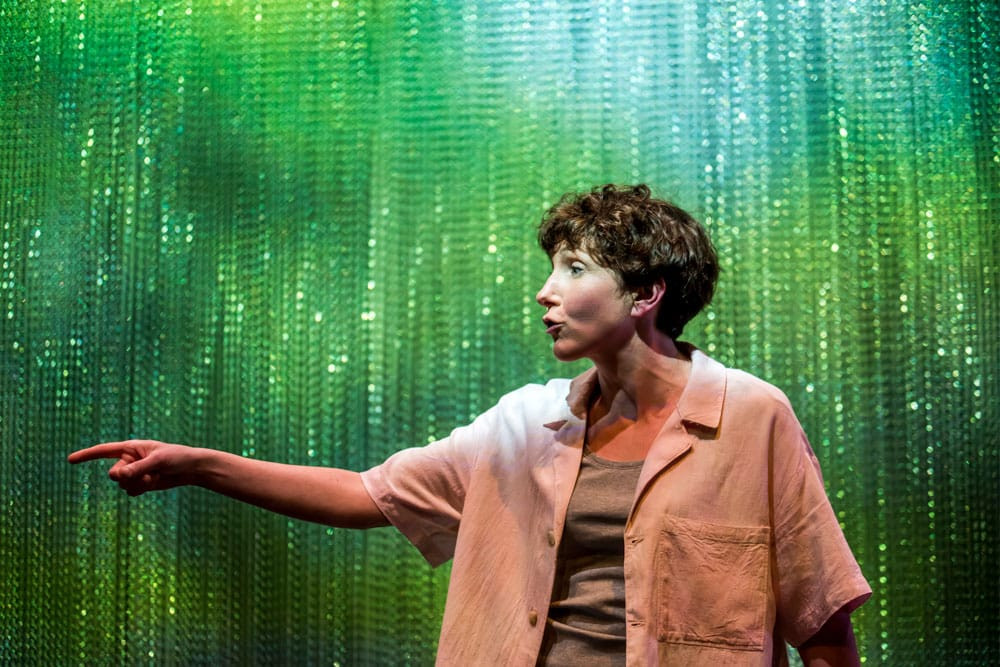
On growing up in the Lake District
The outdoors was a huge part of my life because of my parents – my dad was a keen climber and cyclist, and every weekend was about being dragged out on the mountains. I say ‘dragged out’ because as a kid it felt like that – but now I’m just so grateful for being dragged out! I was in that world of the mountains and water from a young age without knowing any different.
On swimming
The best thing about swimming in any body of water, is that people can’t get you. I like the idea of escapism. If I’m out in the middle of the lake, I’ve taken myself away into something where people can’t come and get me or ask for stuff.
But the actual effects of cold water… You could go into it for ages, it’s such a big thing at the moment. I’ve done it since I was a kid – it wasn’t called ‘wild swimming’ then – and physically, I’ve noticed the benefits.
I’ve built up a definite tolerance to cold water. I swim all year round in a costume or naked, depending on where I am. It’s helped me with my illness – I have an over-reactive immune system. It’s helped me with my Raynaud’s. It’s improved the quality of my circulation and how quickly I get over illnesses or colds. And I think that mentally it builds you up as well – that preparation of going into something cold gives you a strength.
So there are all sorts of things that it’s done for me and for people around me; the community, obviously, but also how the water has helped us all in aspects of healing.
Even though it’s a very popular thing, and some people roll their eyes at how people go on about it, there’s no denying that there is something going on there. How we access the natural world, without a doubt benefits us.
It was about exploring why people kept returning to swimming, and what was this free medicine…this ritual that people had of going for their swims.
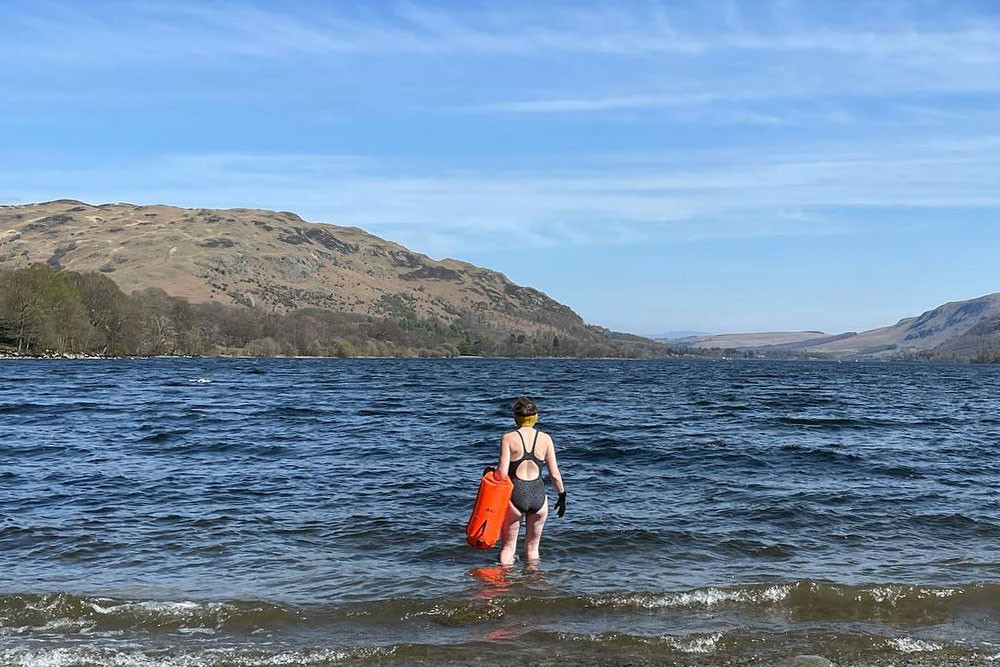
On ‘dipping’ or ‘swimming’
In the show, I give people a sense of relief when I say, ‘I can’t swim front crawl. I am that breaststroke woman you see out in the middle of a lake, looking like she’s lost – aimlessly swimming around with no clear place to reach.’
I put it out there so people know my status – that I go out with my friends and have a chat and a natter and I openly tut and roll my eyes at the people doing front crawl and laps, passing me, and wishing I could do front crawl like that.
But I’m also a spontaneous swimmer. If I see some water and I’m out walking the dog I will just strip down and have a dip. I’m much more unplanned. If a friend asks me I’ll go and do it, or if I wake up and have some time to myself without the kids I’ll nip out and go for a swim. I’m not on an exercise regime and I’m really not a strong swimmer.
On the Lake District’s outdoor swimming scene
When I was doing SWIM at Theatre by the Lake (TBTL), every day I was trying to swim with someone new – getting them to take me to their favourite swim spot, and blogging about the people I was meeting in these communities.
I put a call out on all of the outdoor local swimming groups and that spread the word. There are so many groups – the Bassenthwaite Swim Babes, the Sunset Skinnies, the Blue Tits… They all had brilliant names. And they’d all have gossip about the different groups and what classified as swimming or dipping or whatever.
We worked with the National Trust so that people could access the audio in natural environments, whether on the coast, looking out at the sea, around a lake or in some woods.
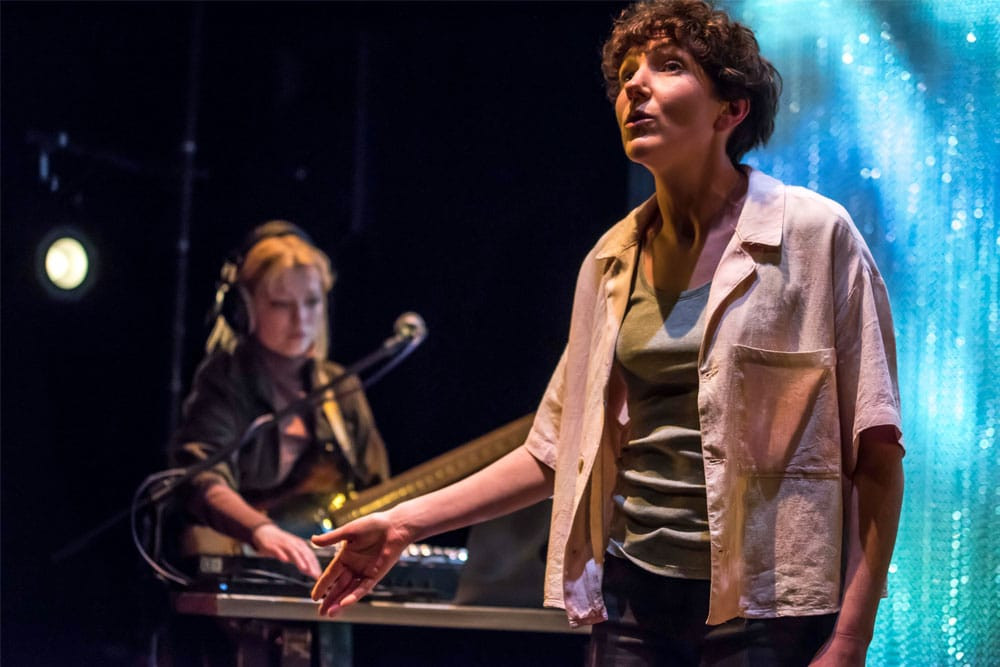
On Theatre by the Lake
When I came out of acting school my very first audition was to do a season at TBTL and I was terrified. I didn’t get that part because I was so nervous and messed up playing the flute.
But that was my memory of it and it was only when I started to create my own work and write my own plays that it became apparent to me that I wanted to go back to the community that I grew up in. I got in touch with Liz Stevenson, the new artistic director at TBTL and, and pitched my ideas to her. I ended up rewriting SWIM for TBTL (originally, I was working with Home in Manchester).
The actual story isn’t about swimming in Derwentwater, where the theatre is. It goes more into my moving back from London into a rural environment in the Peak District and meeting this community of swimmers. But the community that came to see it at TBLL, and the swimmers, felt like it was for them. It’s such a broad subject, swimming. Community brings people together whether you’re a swimmer or not.
On where the SWIM show came from
I started swimming again when I moved to the Peak District, to get to know my community and engage with natural surroundings, but also to meet friends. I was struck so much by these reoccurring events… people I was meeting swimming who had been hit by grief in their lives. I wanted to dig into it; and it gradually started to become a show idea in my head.
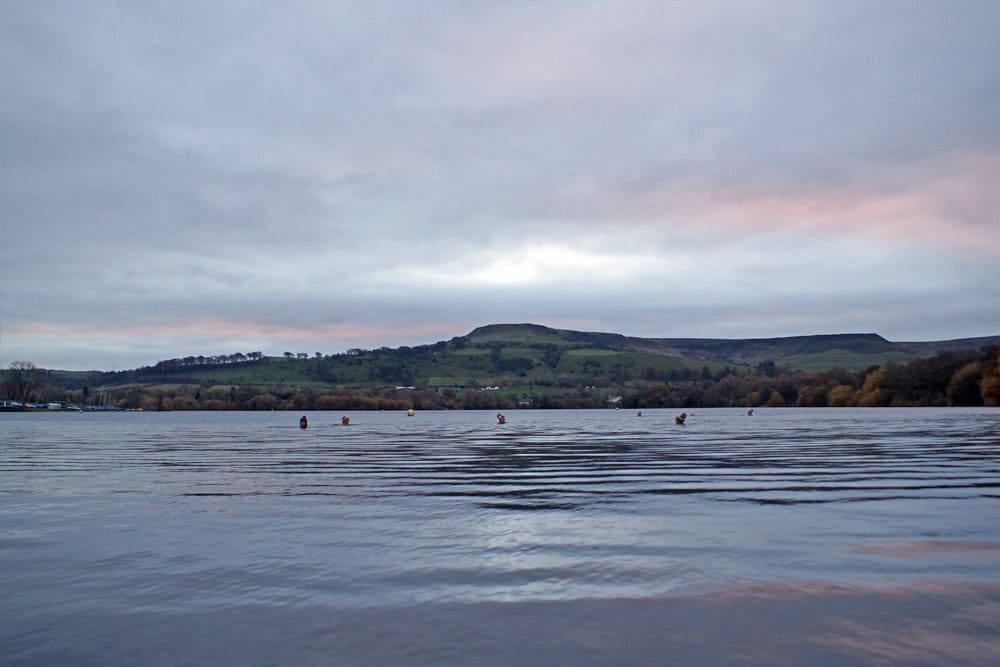
On the comfort of water
Rather than just being addicted to swimming – which there definitely are those groups of people where it’s for them and nothing else – it was more about exploring why people kept returning to it, and what was this free medicine… It wasn’t just about the water; it was about this ritual that people had of going for their swims and what they did before and what they did after.
It was more about conversations in the water and how those lives exist on land when you take the water away – how do we still cope? So it’s not all about celebrating how wonderful swimming is – I wanted to be realistic about how we have to keep going in life, and we can’t just depend on swimming and being in the water together. It’s about the balance between comfort and escapism – and when it’s not healthy to depend on it.
On striking the balance between lightness and shade…
Humour has to come along with suffering because…lightness and joy! You can’t sit through life without it, I don’t think. Humour has always been in my writing because whether I’ve been part of someone else’s suffering or it’s been my own suffering, it’s the only way that I’ve been able to keep going.
I think it’s essential to allow people to either laugh at me or laugh at themselves or laugh at the situation eventually. Not the cause of grief itself – but to have release and relief. It’s also a way of giving people a break; allowing everyone to laugh together, without laughing at what has happened. Humour comes from a recognition of common experience.
The beauty of the audio is that it doesn’t have to be in a beautiful place – audio allows you to close your eyes and go anywhere.
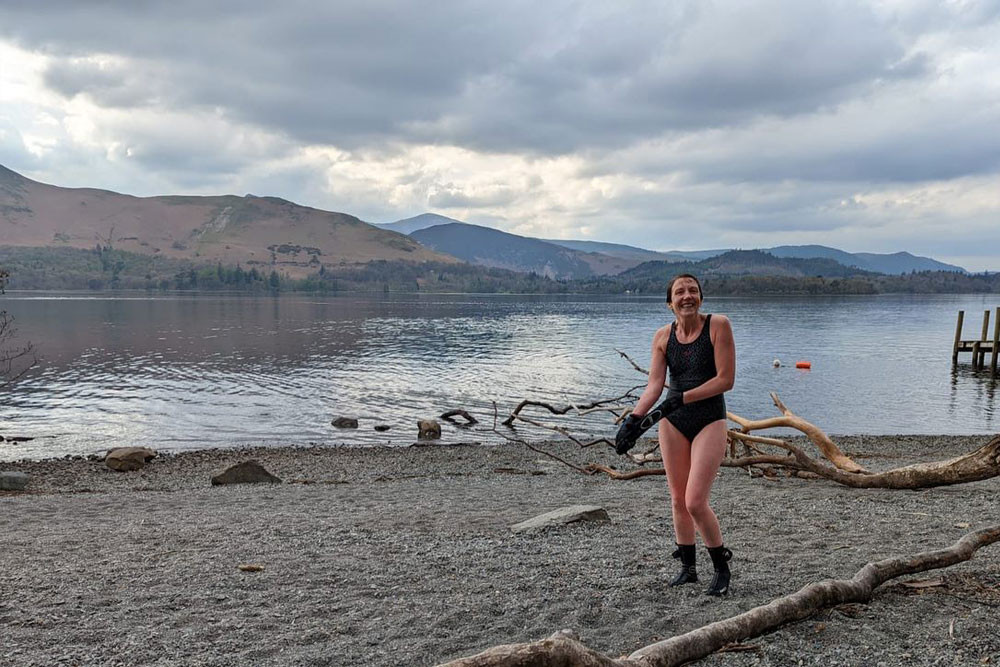
On the audio
We worked with the National Trust so that people could access it in natural environments, whether that was down on the coast, looking out at the sea, or around a lake or in some woods. There are about 30 QR codes around the country, in National Trust locations, where you can stumble upon it and listen.
You don’t have to see water. Some of the places the QR codes were situated aren’t next to water. I had people sending me photos who had stumbled across it in this random place somewhere I didn’t even know it had been put, hundreds of miles away. It was so nice. The beauty of the audio is that it doesn’t have to be in a beautiful place – audio allows you to close your eyes and go anywhere.
The audio version is only 15 minutes, so it’s really stripped-down, mainly focused on swimming excerpts. We cut out the hard-hitting grief that’s in the live show [although note the trigger warning at the start]. You have to be very careful when you’re just exposing it to someone and you don’t know where they’re listening to it or how they’re feeling.
On the music
I started working with Carmel Smickersgill, who composed and performed the music for SWIM, in 2018. She’s absolutely brilliant. She’s so flexible with what she can offer, and how she works around me. For SWIM, I wrote the play and she came up with music around the different chapters and themes that I’d made, then made the score. The music was absolutely integral to the storytelling, for me.
Carmel also worked with our director creating a coloured score, layering up these different ‘colours’, moods and refrains made up of the characters, events and locations. It’s absolutely magical; she’s exceptionally talented. She supports incredible artists like Anna Meredith and is on at the Barbican one day and BBC 6MUSIC the next. She has a real variety to her work.
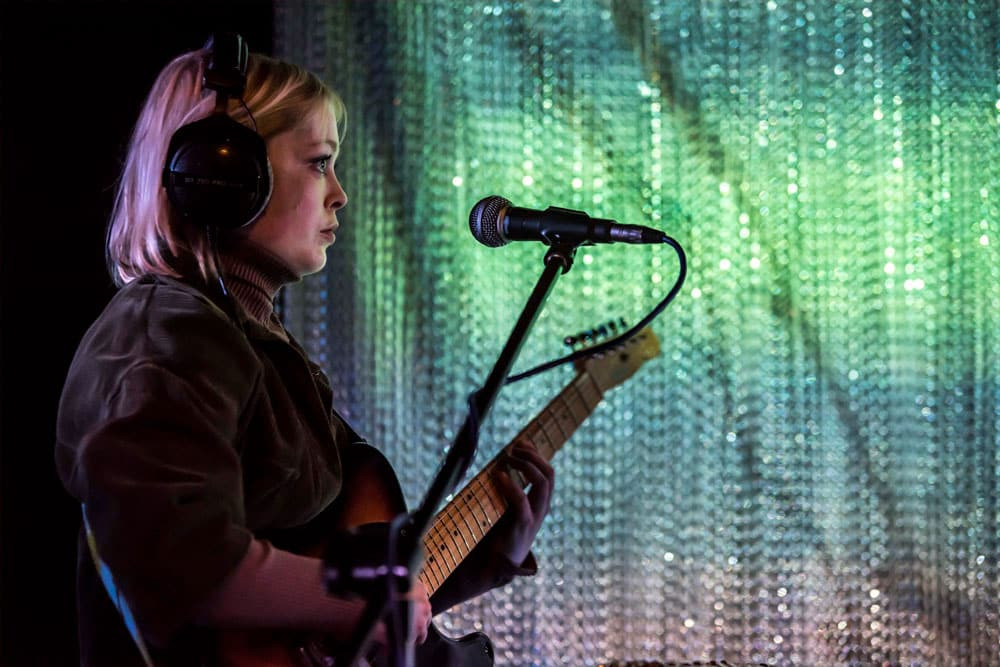
+
LISTEN to the free 15-minute audio version of SWIM
lrproductions.co.uk
theatrebythelake.com
Our renowned open water swim guide and coach Colin Hill, runs cold water swimming sessions daily from the door of the hotel. From an introduction to swimming sessions, cross lake adventures, and stargazing night swims, you can book your session when you book to stay.